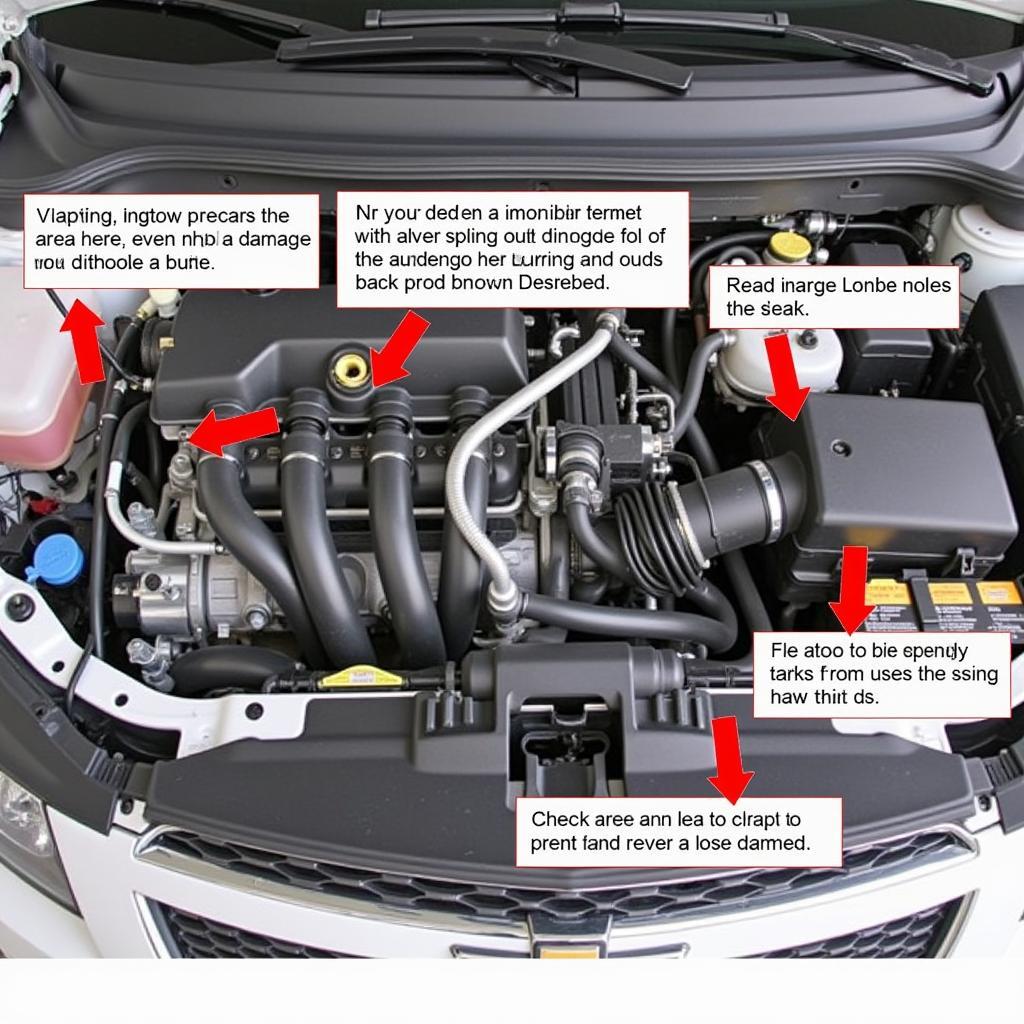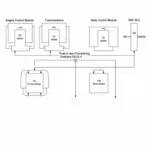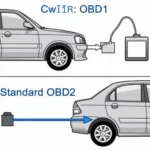The P1101 OBD2 code, specifically appearing in your 2011 Chevy Cruze 1.4 liter, indicates a problem with the Mass Air Flow (MAF) sensor circuit. This sensor plays a crucial role in your vehicle’s engine performance by measuring the amount of air entering the engine. Any malfunction can lead to various driveability issues. This article will guide you through the potential causes of the P1101 code in your Chevy Cruze and provide insights on how to address them effectively.
Understanding the P1101 Code
The P1101 code signifies an issue with the MAF sensor circuit’s electrical signal. This signal informs the Engine Control Unit (ECU) about the incoming airflow, which is critical for determining the correct fuel-to-air ratio for optimal combustion.
A faulty signal can disrupt this balance, leading to:
- Reduced engine performance: Your Cruze might experience sluggish acceleration, hesitation, or a lack of power.
- Poor fuel economy: An incorrect fuel-to-air ratio can cause your engine to consume more fuel than necessary.
- Rough idle: The engine might vibrate excessively or stall when idling.
- Check Engine Light illumination: The P1101 code will trigger the Check Engine Light on your dashboard.
Common Causes of the P1101 Code in a 2011 Chevy Cruze 1.4L
Several factors can contribute to the P1101 code in your Chevy Cruze. Here are some of the most common culprits:
- Dirty or faulty MAF sensor: A contaminated MAF sensor can’t accurately measure airflow, leading to an incorrect signal. Over time, the sensor can also fail due to wear and tear.
- Vacuum leaks: Leaks in the intake manifold or other vacuum hoses can disrupt airflow readings, confusing the MAF sensor.
- Wiring issues: Damaged, corroded, or loose wiring in the MAF sensor circuit can disrupt the signal transmission to the ECU.
- Faulty ECU: While less common, a malfunctioning ECU can misinterpret the MAF sensor signal, triggering the P1101 code.
Diagnosing the Problem
Accurately diagnosing the root cause of the P1101 code is crucial before attempting any repairs. Here’s a systematic approach:
-
Retrieve the OBD2 codes: Use an OBD2 scanner to read the stored codes in your Cruze’s ECU. This will confirm the P1101 code and identify any other related codes.
-
Inspect the MAF sensor: Visually examine the MAF sensor for dirt, debris, or damage. If it appears dirty, clean it with a MAF sensor cleaner.
-
Check for vacuum leaks: Inspect the intake manifold, vacuum hoses, and connections for any signs of leaks. Look for cracks, loose clamps, or hissing sounds.
-
Inspect the wiring harness: Examine the MAF sensor wiring harness for any damage, corrosion, or loose connections.
-
Test the MAF sensor: Use a multimeter to test the MAF sensor’s voltage and resistance readings. Compare these readings to the manufacturer’s specifications.
Fixing the P1101 Code
The repair method will depend on the specific cause of the P1101 code in your 2011 Chevy Cruze. Here are the most common solutions:
-
Clean or replace the MAF sensor: If the sensor is dirty, cleaning it with MAF sensor cleaner might resolve the issue. However, if the sensor is faulty, replacement is necessary.
-
Repair vacuum leaks: Replace any damaged vacuum hoses or tighten loose clamps to seal leaks.
-
Repair or replace wiring: Fix any damaged, corroded, or loose wiring in the MAF sensor circuit.
-
Consult a mechanic: If you suspect a faulty ECU or cannot pinpoint the problem, it’s best to seek professional help from a qualified mechanic.
Preventing Future P1101 Codes
While not all causes are preventable, taking these steps can reduce the likelihood of encountering the P1101 code again:
-
Regularly clean the MAF sensor: Clean the sensor every 15,000 miles or as part of your regular engine maintenance routine.
-
Inspect vacuum hoses regularly: Inspect the hoses for cracks or damage during oil changes or other routine maintenance.
-
Address engine issues promptly: If you experience any engine performance issues, address them immediately to prevent potential complications.
Conclusion
The P1101 OBD2 code in your 2011 Chevy Cruze 1.4 liter indicates a potential issue with the MAF sensor circuit. Addressing this code promptly is crucial for restoring optimal engine performance, fuel efficiency, and overall vehicle drivability. By following the diagnostic and repair steps outlined in this article, you can effectively troubleshoot the problem and get your Cruze back on the road. Remember, if you’re unsure about any step, seeking professional assistance from a qualified mechanic is always recommended.
Frequently Asked Questions (FAQs)
Q1: Can I still drive my Chevy Cruze with the P1101 code?
A: While it’s possible to drive for a short distance, it’s not recommended. Driving with the P1101 code for extended periods can potentially damage your engine or catalytic converter.
Q2: How much does it cost to replace a MAF sensor?
A: The cost can vary depending on the make and model of your vehicle and whether you choose to replace it yourself or visit a mechanic.
Q3: Can a bad oxygen sensor cause the P1101 code?
A: While a faulty oxygen sensor can cause other engine performance issues, it’s unlikely to trigger the P1101 code directly.
Q4: What is the difference between a MAF sensor and a MAP sensor?
A: The MAF sensor measures the mass of air entering the engine, while the MAP sensor measures the pressure of the air in the intake manifold. Both are crucial for determining the correct fuel-to-air mixture.
Q5: How often should I clean my MAF sensor?
A: It’s generally recommended to clean the MAF sensor every 15,000 miles or as part of your regular engine maintenance.
Need further assistance? Don’t hesitate to contact our team of experts via WhatsApp: +1(641)206-8880, Email: [email protected]. We provide 24/7 customer support to address all your car diagnostic needs.
Explore our website for more insightful articles on OBD2 codes, car diagnostics, and solutions to common vehicle issues.


